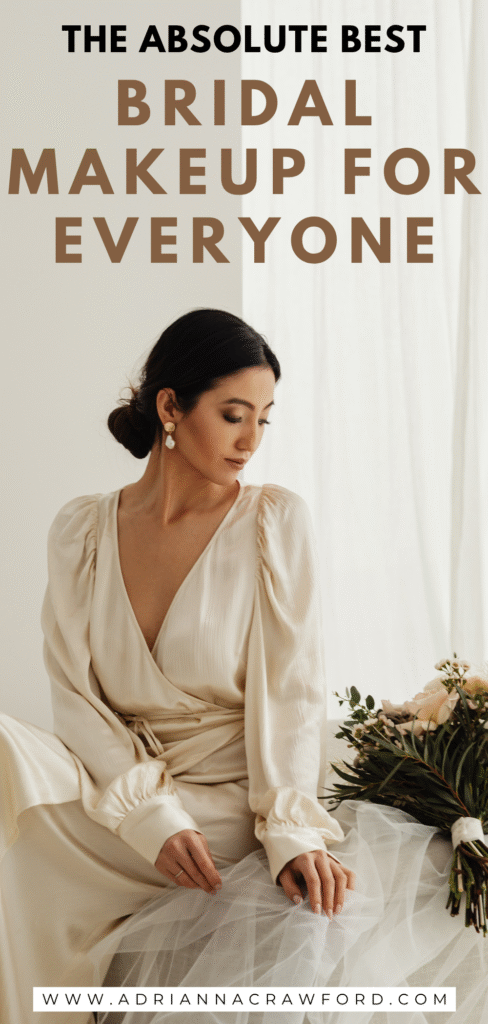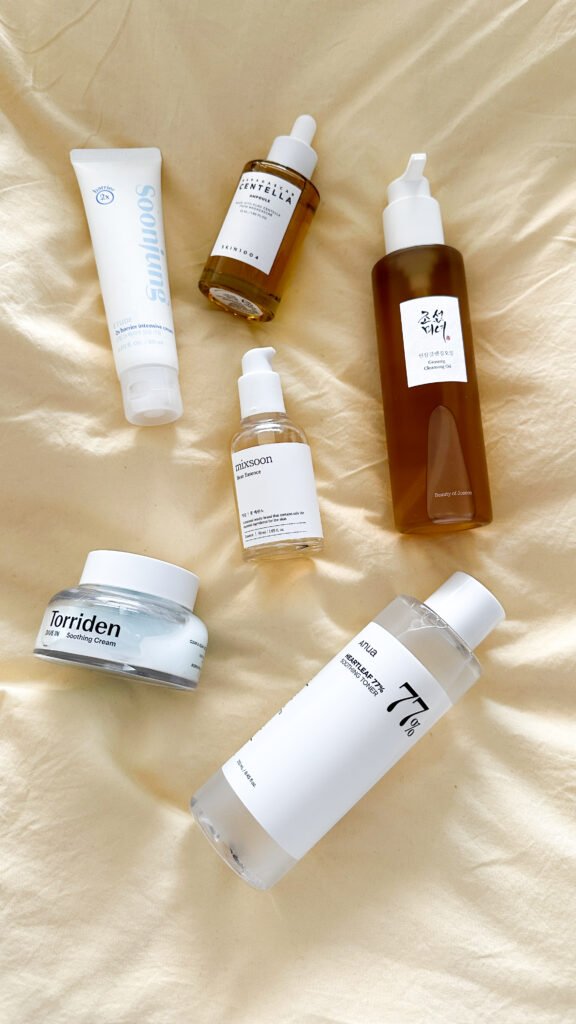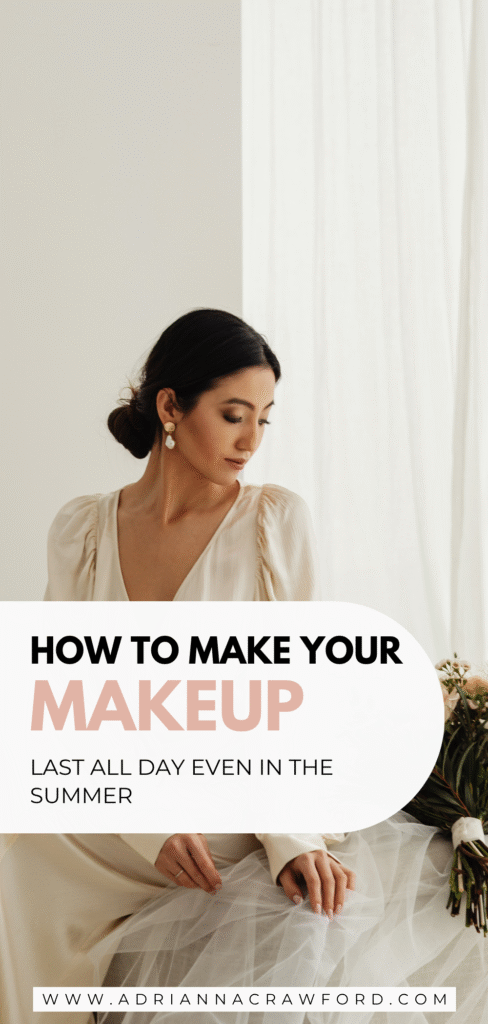One of the biggest misconceptions I hear as a bridal makeup artist is that there’s one perfect product or “holy grail” look that works for every bride.
In reality? Your skin type completely changes how makeup wears throughout the day.
Bridal makeup isn’t just about looking good when you leave the makeup chair—it has to last through hours of happy tears, heat, hugging, dancing, and photos.

So the key to flawless, long-lasting makeup isn’t just technique—it’s knowing how to work with your skin, not against it.
Whether your skin is oily, dry, sensitive, or somewhere in between, this guide will walk you through how to prep, apply, and set your bridal makeup to make sure you look radiant from “I do” to last dance.

Understanding Your Skin Type
Before we get into product recommendations and application tips, let’s break down the four main skin types most brides fall into:
- Oily – Produces excess oil throughout the day, especially in the T-zone. Makeup may break apart or look shiny too quickly.
- Dry – Can feel tight or flaky, especially around the nose, cheeks, or forehead. Makeup may cling to dry patches or look dull.
- Combination – Oily in some areas (usually T-zone) and dry or normal elsewhere.
- Sensitive – Easily reacts to products, temperature, or friction. May flush, itch, or break out from ingredients or makeup texture.

Bridal Makeup for Oily Skin
Common Concerns: Makeup sliding off, excess shine in photos, enlarged pores, and uneven texture.
Prep Tips:
- Use a gentle foaming or gel cleanser to start with a clean slate.
- Apply a lightweight, oil-free moisturizer to balance hydration without triggering more oil production.
- Use a mattifying primer in the T-zone (forehead, nose, chin) to help control shine and reduce pore visibility.
Foundation Tips:
- Choose an oil-free, long-wear matte foundation. Look for formulas labeled “transfer-resistant” or “sweat-proof.”
- Apply in thin layers with a damp sponge or dense brush, then press into the skin for staying power.
- Avoid overly dewy foundations, which can make you look greasy by the first dance.
Setting Tips:
- Press a translucent setting powder into your T-zone with a puff. Don’t bake for too long or it’ll look cakey—just set and move on.
- Use a setting spray that controls oil, like Urban Decay All Nighter or Skindinavia Oil Control.
- Keep blotting papers or an oil-absorbing powder on hand for mid-day touch-ups.
Pro Tip: Avoid over-powdering early in the day—it can mix with your skin’s oils and turn into a paste. Light layers win every time.
Bridal Makeup for Dry Skin
Common Concerns: Flakiness, dullness, tightness, foundation clinging to dry patches, or makeup looking “cakey.”
Prep Tips:
- Use a hydrating cleanser or micellar water that won’t strip your skin.
- Apply a rich moisturizing cream—my go-to is Cetaphil Moisturizing Cream—to nourish and create a smooth base.
- Layer a hydrating serum or snail mucin underneath for added glow and bounce.
Foundation Tips:
- Choose a lightweight, hydrating foundation with a radiant finish (think: Giorgio Armani Luminous Silk or NARS Light Reflecting).
- Mix in a drop of facial oil with your foundation if your skin feels extra parched.
- Apply with a damp sponge to press product into the skin without disturbing texture.
Setting Tips:
- Use minimal powder—only in the T-zone if needed. Choose a soft, finely milled formula that won’t emphasize dry patches.
- Finish with a hydrating setting spray (like MAC Fix+ or Milk Hydro Grip Spray) to melt all the layers together.
Pro Tip: Gently exfoliate the night before your wedding with a mild enzyme or lactic acid product. Don’t use physical scrubs—they can cause micro-tears and irritation right before the big day.
Bridal Makeup for Combination Skin
Common Concerns: Oiliness in the T-zone, dryness on cheeks, makeup looking patchy, uneven wear.
Prep Tips:
- Use a gentle gel cleanser and apply different products to different zones if needed. (For example, oil-control primer on your nose, hydrating primer on cheeks.)
- Apply a lightweight moisturizer everywhere to balance the skin.
Foundation Tips:
- Go for a long-wear foundation with a natural finish (like Estée Lauder Double Wear or Makeup Forever HD Skin).
- Use a damp sponge to avoid streaks and help control product distribution.
- Build in light layers rather than trying to cover everything at once.
Setting Tips:
- Spot-set with powder in oily areas, skip powder on drier zones.
- Use a hybrid setting spray that offers both longevity and glow (try Charlotte Tilbury Airbrush Flawless Setting Spray).
Pro Tip: Use a mattifying primer only where you need it. Don’t apply it all over—your dry zones won’t appreciate it.
Bridal Makeup for Sensitive Skin
Common Concerns: Redness, irritation, breakouts, reacting to ingredients like fragrance, alcohol, or certain SPF formulas.
Prep Tips:
- Stick to a simplified, fragrance-free skincare routine in the weeks leading up to the wedding.
- Snail mucin is one of my favorite gentle hydrators for sensitive skin—it calms and moisturizes without heaviness.
- Avoid anything new the week before the wedding (no last-minute peels, masks, or skincare switches).
Foundation Tips:
- Choose a foundation with a clean formula—look for labels like “non-comedogenic,” “fragrance-free,” and “dermatologist-tested.”
- Mineral foundations or serum-based foundations can work well for easily irritated skin.
- Spot conceal instead of layering too much coverage all over if your skin is prone to redness or sensitivity.
Setting Tips:
- Use minimal powder, and avoid alcohol-heavy setting sprays.
- Keep a calming mist or skin-soothing spray in your bridal emergency kit (like Avene Thermal Spring Water).
Pro Tip: Do a trial of every product—from primer to setting spray—at least a month before your wedding. Your skin will thank you.
Bridal Skincare Tips to Make Any Makeup Routine Work
Regardless of your skin type, healthy skin = better makeup. Here’s what I recommend for all brides:
- Start early. If you want to make changes to your skincare routine (like retinol or actives), start at least 3–6 months out.
- Moisturize daily. Yes, even oily skin types. Hydration keeps the skin barrier happy.
- Use SPF daily. I always recommend daily sunscreen during the months leading up to your wedding. But on the wedding day itself? Only wear it if you know for sure it won’t cause flashback in photos.
- Don’t try new products within 7 days of your wedding. No new facials, masks, peels, or treatments. Stick with what you know.
💡 As a bridal artist, I love using skincare like Cetaphil Moisturizing Cream, snail mucin, gentle retinol in the months leading up, and a flashback-free setting spray to lock in the look without compromising the photos.
My Must-Have Bridal Makeup Kit by Skin Type
Oily Skin:
- Primer: Tatcha The Silk Canvas or Milk Hydro Grip
- Foundation: Estée Lauder Double Wear
- Powder: Laura Mercier Translucent Setting Powder
- Setting Spray: Skindinavia Oil Control
Dry Skin:
- Primer: Charlotte Tilbury Magic Cream
- Foundation: NARS Light Reflecting
- Powder: Hourglass Veil Translucent Setting Powder (only if needed)
- Setting Spray: MAC Fix+ or Caudalie Beauty Elixir
Combo Skin:
- Primer: Smashbox Photo Finish on T-zone, glowy primer on cheeks
- Foundation: Makeup Forever HD Skin or Dior Backstage
- Powder: RCMA No Color Powder
- Setting Spray: Charlotte Tilbury Airbrush Flawless
Sensitive Skin:
- Primer: Vanicream Daily Facial Moisturizer as a base
- Foundation: Ilia Super Serum Skin Tint or BareMinerals Original
- Powder: Avoid if you can; otherwise, try RMS Beauty Un Powder
- Setting Spray: Tower 28 SOS Spray (also calms redness!)
Final Thoughts
Your wedding makeup should reflect your style and your skin’s unique needs. With the right prep and products, any skin type can look glowy, natural, and flawless all day long. Whether you’re doing your own makeup or working with an artist, make sure to tailor your routine to your skin type—because comfort and confidence are the ultimate bridal glow.
This blog post is all about how to create a bridal makeup routine that works for your skin type.

Leave a Reply